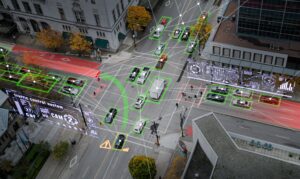On December 1, 2023, IESE Business School and EIT Urban Mobility embarked on their first joint endeavour at an Incubation Workshop hosted by IESE’s PPP for Cities (Public-Private Partnerships) research centre in Barcelona. Under the guiding theme of “A Vision for Barcelona’s Future,” the event served as an open forum to address Barcelona’s multifaceted urban challenges collaboratively, emphasising the kind of innovative partnerships and capacity building initiatives that underscore the core objectives of EIT Urban Mobility’s Academy.
The workshop convened more than 60 representatives from 30 institutions, including Barcelona Global, Clúster Catalonia Logistics, EURECAT and Institut Cerdà, with the support of Ajuntament de Barcelona and Familia Torras. This collaborative event signified more than a partnership milestone; it epitomised the spirit of collective action and shared responsibility in addressing the complex challenges faced by modern urban landscapes.
Several interactive debates were held by the research advisory groups (RAG) on Mobilitty, Logistics, Energy & Resources, Innovation and Urban Studies. In the first of these, EIT Urban Mobility’s Stakeholders and Partnerships Manager, Marta Álvarez, joined IESE Strategic Management Professor and PPP Cities Academic Director, Joan Enric Ricart, to discuss the Mobility RAG’s proposal, which emphasised the indispensable role of data-centric approaches and robust governance structures to address urban mobility challenges. The Mobility RAG also includes:
- Jim Ahtes, Senior Innovation Manager, Fundació i2CAT
- Lluís Alegre Valls, Mobility Director, ATM Barcelona
- Elena Aguarta, Director of Mobility Innovation Services, Movenria
- Jordi Bacardit, Senior Public Policy Manager, TIER Mobility
- Jordi Casas Juan, City Development Manager, EIT Urban Mobility
- Margarida López Romero, Director of Innovation & Digital Transformation, Transports Metropolitans de Barcelona
- Noemi Moya, Director of Public Affairs, FREENOW
- Jordi Ortuño, Manager innovation, Ajuntament Barcelona – IMI
- Ramon Pruneda, CTO, AMB Informació i Serveis, S.A.
- Ana Solà, CEO, Direxis / Cinesi
Two key proposals discussed at the event involved last mile logistics: first, the creation of a ‘green label’ that categorises shipments into three levels (A/B/C) to inform consumers about the sustainability of their purchases; and second, the expansion of nighttime distribution to ease congestion in Barcelona. The event concluded with a presentation by Ramon Gras Alomà, researcher and Urban designer at Aretian and author of the new book City Science: Performance Follows Form, which uses artificial intelligence to analyse cities’ spatial design and quality of life.
You can also learn more about these topics in our dedicated courses on Last Mile Logistics and Artificial Intelligence, and upskill yourself or your entire team with more free e-courses, short videos and blended programs offered through the EIT Urban Mobility Academy.

Adina Rose Levin
Adina Levin was born and raised in Chicago, and clocked in over 10 years in New York City before moving to Barcelona. As a freelance writer and creative strategist, she explores cities, culture, media and tech.



